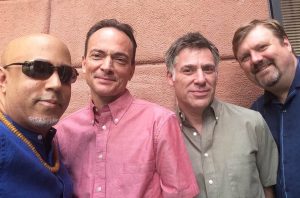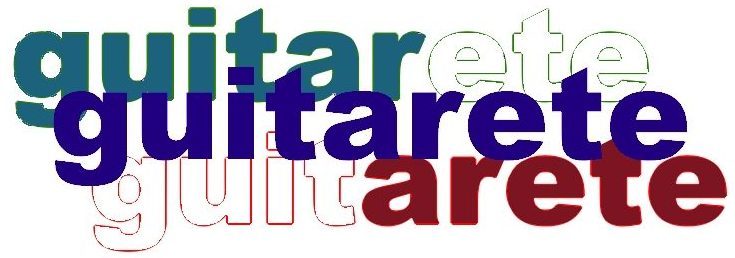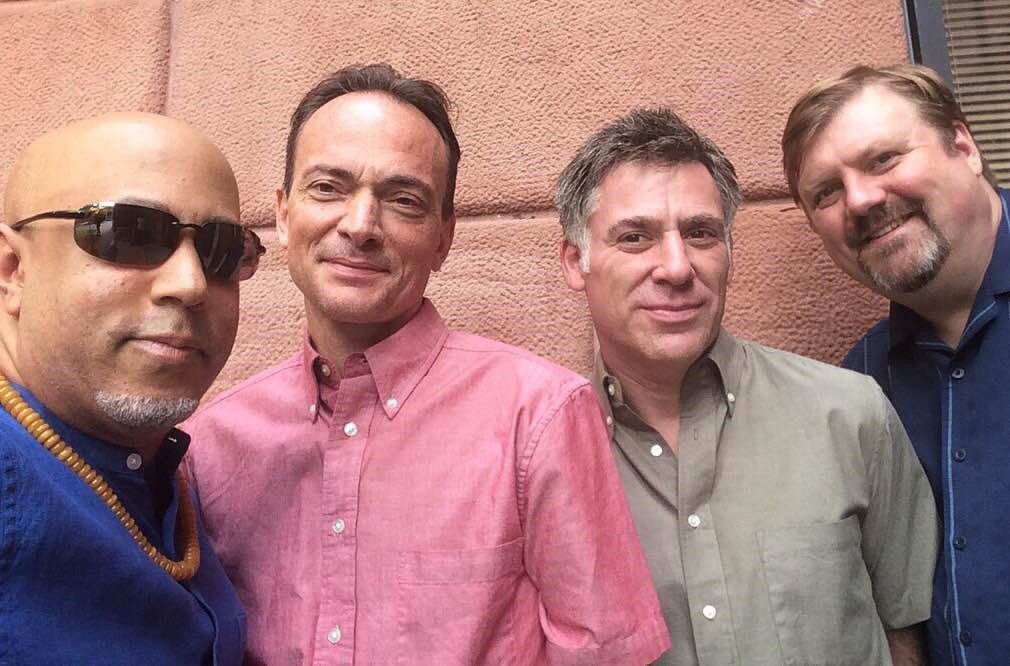Humanity Quartet played a late set full of original compositions, flowing improvisation, structural surprises, and humor to a packed house at Smalls, in New York City’s West Village, in what was actually the earliest hour of August 20. The group consists of esteemed New York City jazz veterans drummer Leon Parker, bassist Sean Smith, tenor saxophonist Joel Frahm, and guitarist Peter Bernstein.

They didn’t explain their name, and I have no official word on this, but it seems to me that the name of the group could be a reference to the subtle, hard-to-notice variations in human interaction that are always happening yet never undermine communication, and without which we’d just be complicated machines. Maybe I’m stretching in my interpretation, but most, if not all, of the tunes in their set of six contained a twist on jazz bandstand conventions.
In opening tune “Spring Standard,” for example, the group sounded to me like it was blurring the edges of the four-bar improvisations commonly traded after solos. During the ballad “Humanity,” Smith’s extended bass exploration was the only solo. “Samba for Evandrea” ended with an unconventional drum solo that featured Parker working his ride cymbal with one stick and one bare hand; accompanying his drumming with vocalizations; and climaxing with a percussive sound that rose in pitch. The last tune, given a deadpan introduction by Smith as “End of the Line,” featured stand-up bass power chords and another out-there solo by Parker, in which he stepped away from the kit entirely and improvised with body percussion and vocalization. Pretty frequently, solos ended without clear markers. And, yet, at no point did the group as whole lose focus or audience attention. It was a fully engaging hour of music that never rambled. I suspect that the group’s willingness to tip some jazz conventions without completely pushing them over and getting in-your-face with self-conscious avant-gardisms has a lot to do with how Humanity Quartet draws and holds attention without commanding it.
While Smith is group’s main composer and Parker is its most radical soloist, Peter Bernstein’s guitar playing is the harmonic vein that runs through its interior. As the quartet’s only chordal voice, Bernstein comped through heads, sax solos, and bass solos, adding support and extension throughout the performance. A huge proportion of his contribution was chord-melody playing; he created an undercurrent of motion no matter who was taking the fore. In his own solos, Bernstein also emphasized chord-melody, with runs that blended Wes-style blocks with crunchier Monk-style textures and stabs. Bernstein’s touch is perfect for this kind of playing; he has the effortless-seeming fretting hand technique and precise right-hand touch that, combined with his harmonic imagination, make much of his playing more pianistic than horn-like.
Humanity Quartet does not seem to have played many previous gigs. Prior to their recent sets at Smalls, I can find only one record of a previous gig (early summer 2016, also at Smalls, with a lineup that included a pianist instead of Bernstein). Parker, Smith, Frahm, and Bernstein offer a fun and interesting twist on some of the standard jazz bandstand formulae—not to mention original tunes well worth hearing again (you can listen to excerpts here ). I can’t imagine future audiences not welcoming Humanity Quartet anywhere they might appear.
[In addition to being a great small venue for jazz, Smalls offers live streaming of shows as they are happening and membership plans that allow viewing of past shows. The club has an artist-friendly and ethical revenue-sharing model that is definitely worth supporting.]

